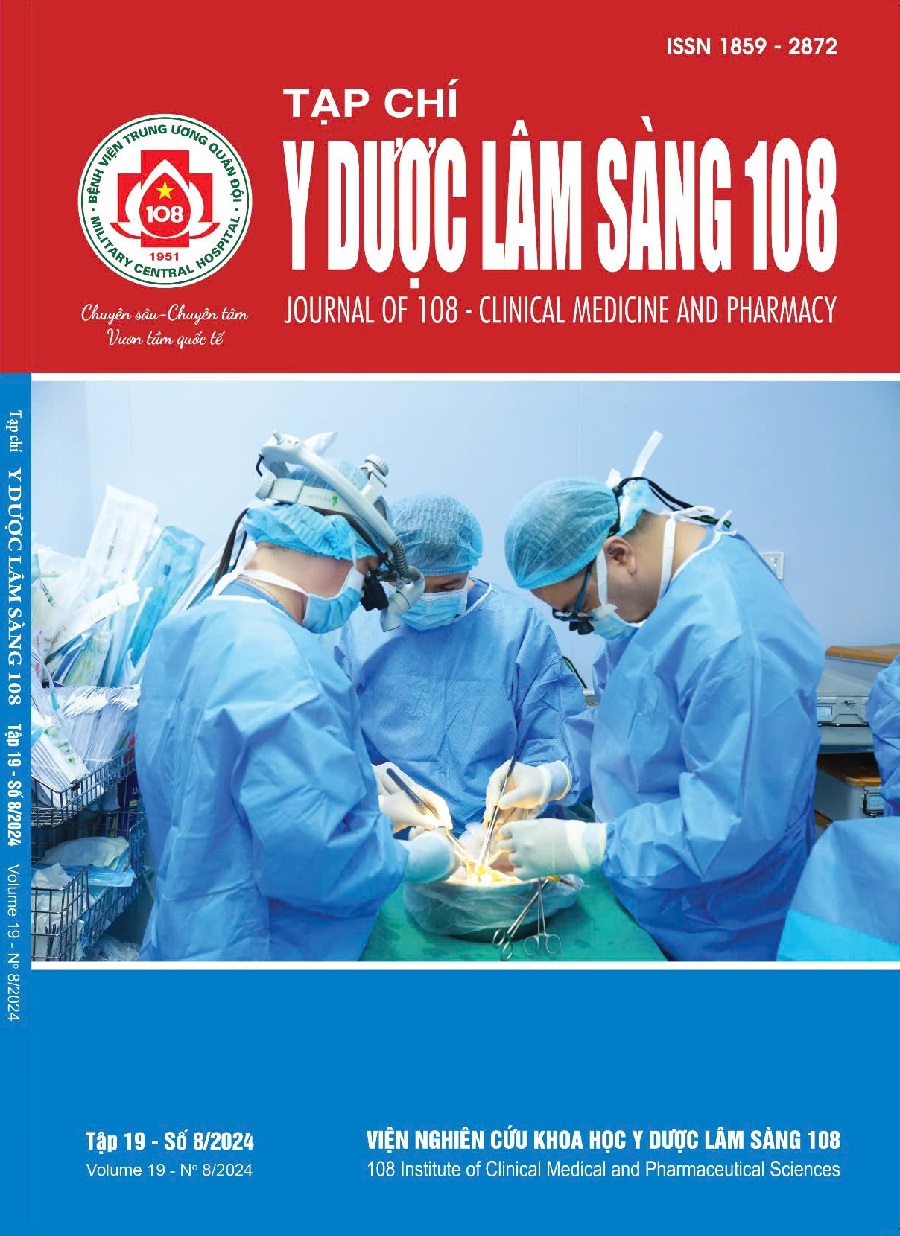Hội chứng Gitelman do đột biến đồng hợp tử hiếm gặp ở gen SLC12A3: Trường hợp lâm sàng
Main Article Content
Keywords
Tóm tắt
Hội chứng Gitelman (Gitelman syndrome) là một bệnh lý ống thận di truyền hiếm gặp, đặc trưng bởi tình trạng nhiễm kiềm chuyển hoá, kali máu thấp, magie máu thấp và canxi niệu thấp. Bệnh gây ra do đột biến trong gen SLC12A3 có vai trò mã hoá cho protein tham gia quá trình đồng vận chuyển NaCl và magie trong đoạn nhạy cảm với thiazide của ống lượn xa. Chúng tôi báo cáo một trường hợp lâm sàng bệnh nhân nam 31 tuổi được chẩn đoán Hội chứng Gitelman bằng xét nghiệm gen, đột biến đồng hợp tử ở gen SLC12A3 tại vị trí NM_001126108.2: c.1145C>T. Tuy đột biến này nằm ở phân loại đang tranh cãi nhưng với bằng chứng lâm sàng phù hợp, cũng như sự tiên đoán của các công cụ tin sinh học cùng với nhiều báo cáo của các tác giả trước đó, chúng tôi ủng hộ việc tái phân loại đột biến này từ nhóm chưa chắc chắn chuyển sang nhóm đột biến gây bệnh. Dựa trên hướng chẩn đoán này, các biện pháp điều trị bằng bù kali, magie cũng như bổ sung nhóm thuốc lợi tiểu kháng aldosterone mang lại hiệu quả rõ rệt cho bệnh nhân.
Article Details
Các tài liệu tham khảo
2. Kardalas E, Paschou SA, Anagnostis P, Muscogiuri G, Siasos G, Vryonidou A (2018) 2018 Hypokalemia: a clinical update. Endocr Connect 7(4): 135-146. doi:10.1530/EC-18-0109.
3. Bettinelli A, Bianchetti MG, Girardin E et al (1992) Use of calcium excretion values to distinguish two forms of primary renal tubular hypokalemic alkalosis: Bartter and Gitelman syndromes. The Journal of Pediatrics. 120(1): 38-43. doi:10.1016/S0022-3476(05)80594-3.
4. Knoers NV, Levtchenko EN (2008) Gitelman syndrome. Orphanet J Rare Dis 3:22. doi: 10.1186/1750-1172-3-22.
5. Blanchard A, Bockenhauer D, Bolignano D et al (2017) Gitelman syndrome: consensus and guidance from a Kidney Disease: Improving Global Outcomes (KDIGO) Controversies Conference. Kidney International. 91(1): 24-33. doi:10.1016/j.kint.2016.09.046.
6. Cruz DN, Shaer AJ, Bia MJ, Lifton RP, Simon DB, Yale Gitelman’s and Bartter’s Syndrome Collaborative Study Group (2002) Gitelman’s syndrome revisited: An evaluation of symptoms and health-related quality of life. Kidney Int 59(2): 710-717. doi:10.1046/j.1523-1755.2001.059002710.x.
7. Parmar MS, Muppidi V, Bashir K (2024) Gitelman Syndrome. In: StatPearls. StatPearls Publishing; 2024. Accessed October 6, 2024. http://www.ncbi.nlm.nih.gov/books/NBK459304/.
8. Tammaro F, Bettinelli A, Cattarelli D, Cavazza A, Colombo C, Syrén ML, Tedeschi S, Bianchetti MG (2010) Early appearance of hypokalemia in Gitelman syndrome. Pediatric nephrology (Berlin, Germany) 25(10):2179-2182. doi: 10.1007/s00467-010-1575-1.
9. Graziani G, Fedeli C, Moroni L, Cosmai L, Badalamenti S, Ponticelli C (2010) Gitelman syndrome: pathophysiological and clinical aspects*. QJM: An International Journal of Medicine 103(10):741-748. doi:10.1093/qjmed/hcq123.
10. Cheng CJ, Shiang JC, Hsu YJ, Yang SS, Lin SH (2007) Hypocalciuria in patients with Gitelman syndrome: Role of blood volume. Am J Kidney Dis 49(5): 693-700. doi:10.1053/j.ajkd.2007.02.267.
11. Voets T, Nilius B, Hoefs S et al (2004) TRPM6 forms the Mg2+ influx channel involved in intestinal and renal Mg2+ absorption. J Biol Chem 279(1): 19-25. doi:10.1074/jbc.M311201200.
12. Diaz G (2021) Gitelman Syndrome Pathophysiology Gitelman Syndrome GrepMed. June 23, 2021. Accessed October 6, 2024. https://grepmed.com/images/13188/pathophysiology-nephrology-gitelman-syndrome-diagnosis.
13. Takeuchi Y, Mishima E, Shima H, Akiyama Y, Suzuki C, Suzuki T, Kobayashi T, Suzuki Y, Nakayama T, Takeshima Y, Vazquez N, Ito S, Gamba G, Abe T (2014) Exonic mutations in the SLC12A3 gene cause exon skipping and premature termination in Gitelman syndrome. J Am Soc Nephrol 26(2): 271-279. doi: 10.1681/ASN.2013091013.
14. Balavoine AS, Bataille P, Vanhille P et al (2011) Phenotype-genotype correlation and follow-up in adult patients with hypokalaemia of renal origin suggesting Gitelman syndrome. Eur J Endocrinol 165(4): 665-673. doi:10.1530/EJE-11-0224.
15. Luo JW, Meng XR, Yang X, Liang JX, Hong FY, Zheng XY, Li WH (2017) Analysis of mutations of two Gitelman syndrome family SLC12A3 genes and proposed treatments using Chinese medicine. Chin J Integr Med 23(6):461-468. doi:10.1007/s11655-016-2461-x.
16. Baldane S, Ipekci SH, Celik S, Gundogdu A, Kebapcilar L (2015) Hypokalemic paralysis due to thyrotoxicosis accompanied by Gitelman’s syndrome. Indian J Nephrol 25(2): 103-105. doi:10.4103/0971-4065.140719.
17. Berry MR, Robinson C, Karet Frankl FE (2013) Unexpected clinical sequelae of Gitelman syndrome: hypertension in adulthood is common and females have higher potassium requirements. Nephrol Dial Transplant. 28(6):1533-1542. doi:10.1093/ndt/gfs600.
18. Zeng Y, Li P, Fang S, et al (2019) Genetic Analysis of SLC12A3 Gene in Chinese Patients with Gitelman Syndrome. Med Sci Monit 25: 5942-5952. doi:10.12659/MSM.916069.
19. Ji W, Foo JN, O’Roak BJ et al (2008) Rare independent mutations in renal salt handling genes contribute to blood pressure variation. Nat Genet 40(5):592-599. doi:10.1038/ng.118.
20. Gallagher H, Soar J, Tomson C (2016) New guideline for perioperative management of people with inherited salt-wasting alkaloses. Br J Anaesth 116(6): 746-749. doi:10.1093/bja/aew102.
21. Larkins N, Wallis M, McGillivray B, Mammen C (2014) A severe phenotype of Gitelman syndrome with increased prostaglandin excretion and favorable response to indomethacin. Clin Kidney J 7(3): 306-310. doi:10.1093/ckj/sfu029.
22. Brambilla G, Perotti M, Perra S, Dell’Oro R, Grassi G, Pincelli AI (2013) It is never too late for a genetic disease: a case of a 79-year-old man with persistent hypokalemia. J Nephrol 26(3): 594-598. doi:10.5301/jn.5000256.
 ISSN: 1859 - 2872
ISSN: 1859 - 2872
